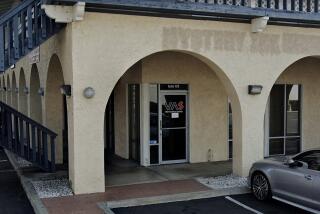Regulators to File Civil Suit This Week Against Former Lincoln Officers
- Share via
Federal regulators will file a civil lawsuit this week against the former operators of the failed Lincoln Savings & Loan in Irvine, alleging numerous fraudulent activities and seeking damages of more than $1 billion, sources close to the case said Wednesday.
The long expected lawsuit, believed to be the biggest ever against a thrift, will be a comprehensive document filling more than 150 pages and covering a wide range of Lincoln’s questionable transactions, from securities trading to real estate deals.
Agency’s First Big Action
The suit is expected to name as a defendant Charles H. Keating Jr., chairman of Lincoln’s parent, American Continental Corp. It also will name most of the former directors of Lincoln and most of the directors and officers of American Continental, the sources said. The suit is expected to be filed in U.S. District Court in Phoenix, where American Continental is based.
The suit will be the first major action filed by the Resolution Trust Corp., the new agency set up to handle failed S&Ls.; The RTC was created last month by the federal law that rescued the S&L; deposit insurance system.
Regulators seized Lincoln on April 14, a day after American Continental, a real estate development firm and Arizona’s fourth-largest business, filed for bankruptcy. Lincoln has been billed by industry experts as the biggest S&L; disaster yet, which could cost taxpayers up to $2.5 billion.
The RTC still must approve the filing of the suit. Sources said RTC officials have not decided yet whether to allege violations of the Racketeer Influenced and Corrupt Organizations Act, known as the RICO statute, which would allow recovery of triple damages.
The suit, sources said, will allege wrongdoing in Lincoln transactions involving high-yield corporate securities known as junk bonds, corporate stock bought by American Continental’s employee stock ownership plan, land sold to related parties allegedly for above-market prices and straw borrowers and straw purchasers allegedly used to avoid direct investment regulations.
The suit also will charge that a tax-sharing plan between Lincoln and American Continental was improper. In the transaction, the thrift gave up $125 million in tax benefits to its parent.
Suit Alleges Fraud
In addition, the suit will claim violations of federal regulations in transactions involving the Pontchartrain Hotel in Detroit and Southmark Corp. in Dallas and its San Jacinto Savings & Loan subsidiary. Southmark, a real estate investment firm, is currently in Chapter 11 bankruptcy. The Pontchartrain is owned by a partnership that includes Keating and other corporate executives.”
The suits also allege fraudulent transactions involving the company’s planned community developments in Hidden Valley, Crowder Valley Ranch and Rancho Vistoso, all in Arizona.
Since Lincoln’s collapse, Keating and American Continental directors and officers have been expecting regulators to file a lawsuit against them. But in a prepared statement, the company criticized the government’s leaks about its plans to sue directors and officers.
“We view the disclosure of this proposed action as part of a series of actions by the federal government to attempt to unfairly injure ACC and its management,” the company said. “All of those allegations that we have seen to date have been baseless. In the event that any complaint raising those allegations is filed in court, we are very confident that we will be able to disprove the allegations and we will prevail.”
A corporate executive, angry over continuous leaks of information, said the government has employed an “effective smear campaign.
“They haven’t even filed the suit and we’ve been lambasted across the world,” he said. “This is nothing but old allegations. There’s no substance to it. They’ve been sitting in our back yard for four years and they couldn’t find anything. And they still haven’t.”
About 22,000 bondholders who bought nearly $200 million in subordinated debentures--which are essentially corporate IOUs--have claimed in a dozen class-action suits that Keating, his executives and accounting and legal advisers were engaged in racketeering.
Those suits also claim that Keating hired former government officials and used politicians to stall regulatory actions against Lincoln so American Continental could continue its alleged fraudulent sale of debentures.
Keating and his executives contributed at least $300,000 to election campaigns of Sen. Alan Cranston (D-Calif.) and four other U.S. senators and, at Cranston’s request, gave an additional $850,000 to three nonpartisan voter registration groups, one of which was formed by Cranston’s son.
The senators twice intervened at Keating’s behest two years ago to question regulators about an unusually long financial examination of Lincoln. And in early April, before regulators seized the S&L;, Cranston urged the three members of the now-defunct Federal Home Loan Bank Board to consider more seriously Keating’s then pending sale of Lincoln.
Cranston and the other senators said they did nothing improper in questioning regulators.
In a statement released Wednesday, Cranston said: “Without in any way prejudging the matter, I believe the FDIC should proceed vigorously against Charles Keating and American Continental Corp.--as it should against any savings institution--if it believes it has grounds for a bank fraud case against them.”
More to Read
Inside the business of entertainment
The Wide Shot brings you news, analysis and insights on everything from streaming wars to production — and what it all means for the future.
You may occasionally receive promotional content from the Los Angeles Times.










